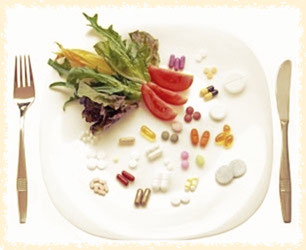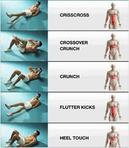
A visit to the health food store can be an experience. It is tough to choose from among the huge variety dietary and nutritional supplements on the shelf. From vitamins to minerals to weight loss pills, there are thousands of options to choose from. But ....
do you really need any of them? Do they really work, and if so, which ones are best?
Who really needs dietary supplements?
It's important to remember that dietary supplements are designed to supplement your diet, not to replace nutritious foods. Supplements are intended to enhance a diet where there are shortfalls. But really foods are more complex, offering not only vitamins and minerals, but fiber, nutrients (carbohydrates, proteins, and fats), phytochemicals, and a whole host of nutritious substances that science has not fully identified that work together with other foods and provide the benefits of a healthy eating pattern.
Thus why we really do not recommend any sort of food supplement if you think your food habits already incorporate all necessary nutrients for your body. However, scientists agree that some people may require supplements because the proteins, vitamins and/or minerals they need are hard to get in adequate amounts in the diet. These groups might include: pregnant women, nursing mothers, strict vegetarians, people with food allergies or intolerances, elderly people or those with diseases such as cancer, or kidney, cardiovascular, or bone disease. We could also add those people who for whatever reason think their diet or food habits have been restricted or compromised, such as people under strict weight loss programs, long term world travelers or people who live under extreme poverty conditions. Furthermore professional or elite sport people or taking extreme fitness programs might require some sort of dietary supplements to help or compensate burnt calories or muscle growing.
Choosing the right dietary supplements
Experts agree there are some rules for choosing the right dietary and nutritional supplements.
- First, better to look for trusted brands that have been around for some time.
- Second, read the claims carefully. If they look too good to be true, they probably are not so good.
- Third, if you want to take it a step further, check out the studies companies site documenting the effectiveness of the product.
- Last but not least, dietary supplements are mainly prescribed for healthy adults. it is recommended to consult with your doctor before taking any dietary supplements, specially if you suffer from any disease, deficiency or pathology. Tell your doctor about any supplements you are taking, even if they are natural extracts. That way, your doctor can check on any potential side effects or interactions with medications.
Our 5 supplement picks
Here we introduce our best picks. Unless otherwise noticed these are all obtained from natural resources.
Multivitamins

Multivitamins are essential nutrients necessary for thousands of metabolic reactions. Taking a daily multivitamin with minerals has long been considered nutritional "insurance" to cover dietary shortfalls. There is no harm in taking a once-daily multivitamin, as long as you select one based on your age and sex. Take it daily or just on days when your diet is inadequate. But better than a multivitamin is to fill in the gaps, do not forget that real food offers so much more than supplements.
Calcium

Calcium is the most abundant mineral in your body, necessary for bones, correct heartbeating, nerve impulses, clotting blood and stimulating hormone secretions. Your body does not make calcium, and in fact loses calcium daily through your skin, nails, hair, sweat and elimination, which is why you must replace it via your diet. Calcium is one of the minerals most often lacking in Americans' diets. We recommend you to take calcium directly from food such as dairy products, fortified foods, dark leafy greens, soybeans, beans, fish, and raisins. Dietary Guidelines recommends three servings of low-fat or non-fat dairy each day to help bridge this gap. But there are plenty of people who reject dairy, the best source of calcium in our diets. If you have not been diagnosed as lactose-intolerant, better give dairy a chance. Start slowly, with a small amount with meals, or try dairy products that are lower in lactose, such as aged cheeses and yogurt. If you are worried about calories, you can go for low calorie dairy or other milk substitute such as soy milk enriched in calcium. If your choice is to take a calcium supplement, look for calcium citrate or lactate. These forms are best absorbed by the body. Also take it with caution because it might have some side effects or interact with other medicines. Talk to a doctor before using Calcium supplements.
Caffeine (great sport stimulant)

Special mention to products that contain stimulants like caffeine since they have been shown to be a performance enhancer. You should make of coffee, green tea or other caffeinated drinks a part of your healthy diet and fitness routine (please read our coffee blog). Caffeine drinks are also lipolytic, "you are actually burning calories as you drink". You can get the same boost from a cup of coffee or any safe caffeinated drink. Notice that some caffeinated supplements might contain some ingredients that could be potentially risky. Also keep in mind that drinking excessive amount of caffeine might be dangerous for your health.
Fish oil (omega-3)

Studies show that fish oil (source of omega-3 fatty acids) may be cardio-protective. Furthermore, fish oils can lower cholesterol. But always choose a fresh fish if you have a choice. If you don't like fatty fish such as salmon, you can eat other kinds of fish such as canned tuna. Just be sure to avoid any fish that is breaded and fried. Foods such as canola oil, soybeans, flax, walnuts and algae are also natural sources of omega-3s, but they are not a substitute for fatty fish. Perhaps because of a heightened fear of mercury levels in all types of fish, people are not coming close to getting enough omega-3 fatty acids in their diets. We recommend fish oil or omega-3 fatty acids supplements if you do not meet the expert recommendations for fatty fish at least twice a week or much better you can take fish oil supplement only during those days you do not eat any fish.
L-carnitine

Most carnitine comes from the liver and kidneys, but you also get some from food specially from animal products. Red meat has the highest levels. Carnitine is also found in smaller amounts in chicken, milk and dairy products, fish, beans, and avocado. Carnitine helps make energy in your body. People take carnitine supplements for athletic performance and weight loss (metabolism booster), heart disease, memory problems, and other issues. Most supplements contain one type of carnitine called L-carnitine. It is the same type present in the food. While carnitine is needed for good health, you probably have all that you need. People with genetic problems and some diseases, as well as premature babies, may have low levels. L-carnitine supplements may help them. L-carnitine is a popular supplement for athletes and fat loss programs. However, studies have not found clear evidence that it helps to improve sports performance, endurance or weight loss. However, L-carnitine supplements do seem to help with heart disease and other heart problems. L-carnitine supplements may also help with thyroid problems, male infertility, memory problems in older people, chemotherapy side effects, and type 2 diabetes. We need more research to know for sure, though. If your choice is to have it you should take it with caution because it might have some potential side effects, risks and interactions with other medicines such as antibiotics. Talk to a doctor before using L-carnitine.
Caution with megadoses
If you decide to take dietary supplements you should respect the printed recommended doses or doctor advice. However, many consumers go way beyond the daily multivitamin recommendations, and take megadoses because they think it is harmless. Contrary to what you might think, exceeding the Recommended Daily Allowances for some vitamins and minerals could be dangerous. Generally speaking, you should not exceed 100% of the recommendation for vitamins or minerals because these supplements are in addition to the food you eat, and potential toxicities may occur. Be especially careful with minerals and-fat soluble vitamins A, D, E, and K, which can build up in your system thus potentially representing a risk for your health .
First edition: 01/02/2015
Do you want to be part of an experimental health program?
We encourage you to test what has been discussed on this blog by yourself and let us know about your experience, your progress and achievements in the comments section below. The results of these experimental program will be presented at international conferences and hopefully published in high impact medical and scientist journals. Your involvement and interaction as well as your contribution is important for us since the information and voluntary donations you provide will be further used for adapting, modifying and improving our programs.
Important notice
This online personal training approach is recommended for healthy adults only. This site is not intended for use by minors or individuals with any type of health condition. Such individuals are specifically advised to seek professional medical advice prior to initiating any fitness or nutrition effort or program.
Recommended articles









obat mani encer (Saturday, 13 August 2016 09:29)
awesome
Cara pengobatan ginjal bocor untuk dewasa dan lansia (Saturday, 30 January 2016 04:32)
thanks for information, this is very interest to read and can understand your blog it
Cara Mengobati (Monday, 25 January 2016 07:29)
article interesting, exciting and amusing discussion
jejen (Wednesday, 13 January 2016 04:04)
I will continue to visit your blog . continue to present the updated information .
penebalan dinding rahim (Monday, 11 January 2016 09:17)
Grazie per gli insegnamenti che sono stati dati . buona fortuna
Cara cepat mengobati jumlah sel darah putih yang naik (Saturday, 09 January 2016 07:37)
thanks for his attentions, we like you article, do not forget to share this article to other
pupuy (Friday, 08 January 2016 04:59)
Thank you for sharing . This article is very useful .
Obat Kulit Bersisik Pada Tangan (Wednesday, 06 January 2016 12:44)
your article is very good to be used as reference material in the search for news items ... thank you
Obat untuk kantung/buah zakar yang besar sebelah (Wednesday, 06 January 2016 04:34)
I agree with article you, Because it can giving information useful to companies. dont forget to share it to other again, thanks
OBAT BUAH ZAKAR BESAR SEBELAH (Tuesday, 29 December 2015 05:36)
Treatment of testicular great next to permanent cure drug use ace maxs large testicles next most efficacious, the most powerful and free from side effects, which you created the article is very useful to us, do not forget also help share our article, thanks
Obat Kulit Bersisik dan Gatal (Saturday, 26 December 2015 12:06)
Thank you for the information, this article is very useful for us all.
Cara Menghilangkan Sel Kulit Mati Pada Wajah (Saturday, 26 December 2015 07:45)
Thank you for the information, this article is very useful for us all.
Obat buah pelir kiri besar sebelah yang alami (Saturday, 26 December 2015 05:15)
thank you for visiting our website, may be useful and do not forget to help share
Obat Kulit Muka bersisik dan Kering (Friday, 18 December 2015 16:28)
gratitude for the knowledge that has been given through your article, very helpful in developing my inspiration.
cara mengobati radang sendi (Thursday, 17 December 2015 02:56)
thank you very much for the information, it is health is very expensive, hopefully with this article can help everyone, healthy greetings from you, do not forget to re-visit our web
pengobatan kulit melepuh yang aman (Saturday, 12 December 2015 03:12)
Terima Kasih Atas Informasinya
Pengobatan Alami Haid Berkepanjangan Dan Banyak (Saturday, 21 November 2015 05:35)
have a nice weekday guys
cara mengobati jantung rematik (Monday, 16 November 2015 03:50)
Thanks for the information glad to be back to visit this blog, greetings success. Do not forget to visit our blog back
Obat Di Apotik (Friday, 16 October 2015 10:25)
thank you post articles that are very useful for me, hopefully in the future, better yet, do not forget to visit my site
Cara Menyembuhkan Luka Caesar dengan Bahan Alami (Saturday, 10 October 2015 04:31)
posts that you make pretty good and I can understand it, continues to increase again, good luck brother, do not forget to visit my website too, thank you ^ - ^
Cara Mengobati Gatal Eksim di Selangkangan (Thursday, 08 October 2015 09:12)
I think your article is pretty good and really helped me in solving a problem, continue to increase again, and do not forget to visit our website :)
Obat Kulit Berair dan Ruam Merah di Tubuh (Wednesday, 30 September 2015 06:10)
article that you created quite so help me solve the problem, thank you for sharing to us all
Cara Menghaluskan Kaki yang Pecah Pecah (Tuesday, 29 September 2015 04:36)
we are expecting the next post can be loaded in detail in order to add aesthetics to the reader, but this time the articles I've read can also inspire me and add science to me
Obat Eksim pada Balita yang Alami dan Aman (Monday, 28 September 2015 08:03)
article that you create a very inspiring and as our solution solves the problem
Tips Tahan Lama Di Atas Ranjang Bagi Pria (Friday, 25 September 2015 09:02)
I was very impressed after reading this information , continue to share your information so that everyone
Obat Benjolan Di Bawah Ketiak Kanan Yang keras (Tuesday, 15 September 2015 09:38)
we say many thanks for the presence of information like this we will know how to treat the disease lumps right, therefore we make an article about bump hopefully useful and accepted the general population.
Mike Dan (Saturday, 12 September 2015 13:51)
My friend mentioned to me your blog, so I thought I’d read it for myself. Very interesting insights, will be back for more!
Obat Mani Bercampur Darah Yang Aman (Thursday, 10 September 2015 10:41)
I was very impressed with this article , I almost every day to visit this article
Obat Kuat Untuk Pria (Saturday, 05 September 2015 09:05)
saya sangat bersyukur bisa membaca informasi anda,karena sangat bermanfaat bagi saya ,terimakasih
Obat Pelangsing Yang Aman Untuk Ibu Menyusui (Monday, 31 August 2015 08:28)
I like the article you shared, is very useful and helpful in finding information. Thank you for the information successfully gan ^^
cara alami menghilangkan kutu rambut pada anak dengan cepat (Tuesday, 11 August 2015 09:29)
Thank you for the information, articles were very nice and helpful
Cara Terbaik Melancarkan Susah BAB Pada Wanita Hamil (Friday, 07 August 2015 06:28)
we expect further enhanced in the manufacture of the article as it will greatly help the reader understand the content of the article.
Obat Pelancar Sembelit Susah BAB Di Apotik (Thursday, 06 August 2015 06:42)
I've been taking my time to read the article that you created with difficulty, and the results are quite satisfactory for me, because there was one thing that made me know and broaden my knowledge, continued to increase again.
Obat Darah Kental Dalam Tubuh Anak (Tuesday, 04 August 2015 06:45)
I think you make postings very good for readers, but there is less I understand from the article that you created, then please circumspection again ^ _ ^
Cara Mengobati Nyeri Sendi Yang Terasa Ngilu (Saturday, 01 August 2015 11:16)
I am very grateful to those of you who have made this article, you've struggled to make this article so that it can be read many people, I think this article is quite clear and interesting.
Cara Mengobati Dan Menyembuhkan Rematik Sendi (Saturday, 01 August 2015 05:32)
thank you for sharing a very useful article I wait for the next post
Tristan (Saturday, 20 June 2015 17:10)
terima kasih buat infonya gan?
Cara sembuh dari sakit telinga (Monday, 08 June 2015 03:06)
interesting article that you created once we will wait for another article, thanks
Obat Sakit Telinga Murah Dan Aman (Friday, 05 June 2015 08:44)
Thank you very nice article, certainly useful for us, success is always ^^
Cara mudah mengobati kista (Saturday, 30 May 2015 05:48)
the information you share is very beneficial for us, thanks
Cara Supaya Tahan Lama Di Ranjang (Wednesday, 27 May 2015 05:16)
This article may be useful to all and thank you for the information
cara mengatasi lemah syahwat (Wednesday, 27 May 2015 04:15)
thanks for the information of this article may be useful and good luck always
Cara mengatasi Haid Tidak Teratur (Tuesday, 26 May 2015 03:35)
Thank you for the information gan good luck always
Cara menghilangkan jamur dikulit (Tuesday, 19 May 2015 09:23)
the information is very interesting, hopefully useful
cara mengobati gagal ginjal akut (Tuesday, 19 May 2015 03:29)
article you share a very interesting and helpful, thank you for sharing health-related information, we are waiting for further information :)
Cara Mengobati Kista Rahim Secara AlamiCara Mengobati Kista Rahim Secara Alami (Monday, 18 May 2015 05:59)
Thank you for sharing information about health article, I'd like to share information and articles that I wait for further information :)
cara mengobati batuk kering dan gatal yang alami (Saturday, 09 May 2015 10:52)
Thank you very nice article, other articles awaited
Cara Terbaik Mengobati Vitiligo Pada Bayi (Thursday, 07 May 2015 09:40)
Thank you so much already provide very interesting information and help all best wishes
Inilah pengobatan kulit vitiligo paling ampuh (Wednesday, 06 May 2015 05:08)
The information was interesting and useful once prosperous thanks greetings
Cara mudah menyembuhkan kista (Tuesday, 05 May 2015 08:31)
Thank you very much for the information very interesting and rewarding success always